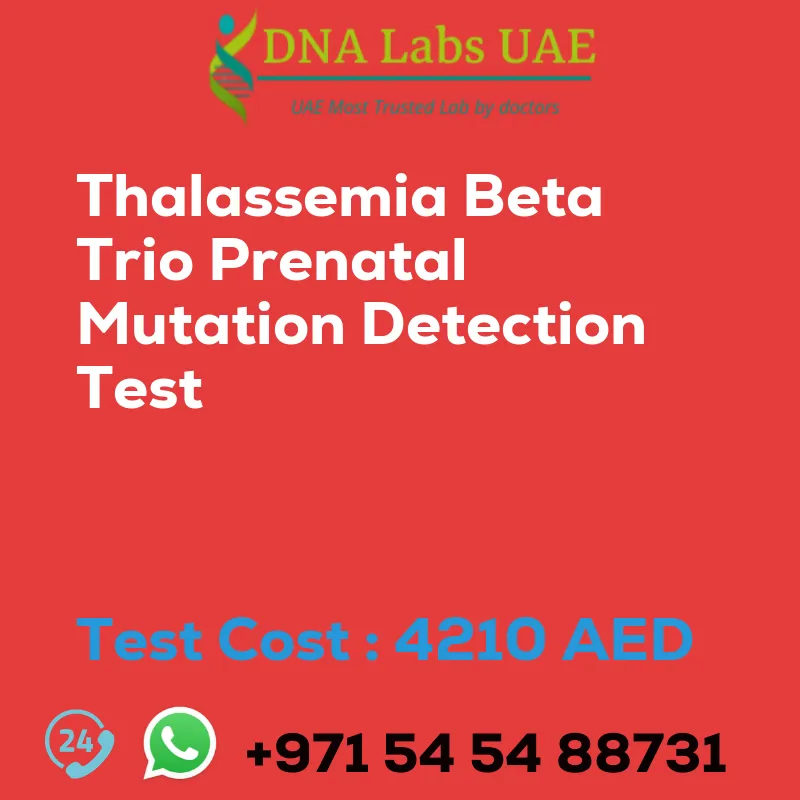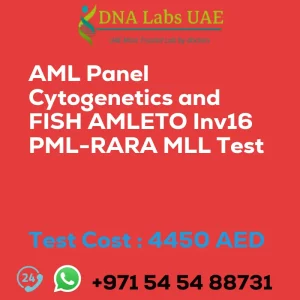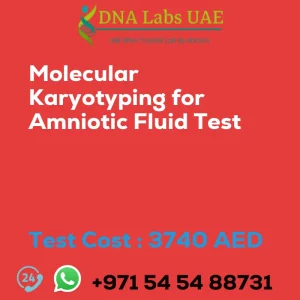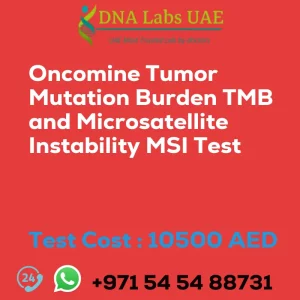THALASSEMIA BETA TRIO PRENATAL MUTATION DETECTION Test
Test Cost: AED 4210.0
Symptoms, Diagnosis, and Details
The Thalassemia Beta Trio Prenatal Mutation Detection Test is a genetic test used to detect mutations in the beta-globin gene associated with thalassemia. Thalassemia is an inherited blood disorder characterized by abnormal production of hemoglobin, the protein responsible for carrying oxygen in the blood.
This test is typically performed during pregnancy to determine if the fetus has inherited mutations in the beta-globin gene from the parents. It is important to detect these mutations early on to provide appropriate counseling and medical management for the affected child.
The Thalassemia Beta Trio Prenatal Mutation Detection Test uses a small sample of the parents’ blood, which contains fetal DNA. The test analyzes specific regions of the beta-globin gene to identify any mutations that may be present.
The results of the test can indicate whether the fetus has inherited mutations associated with thalassemia. This test can provide valuable information to parents, allowing them to make informed decisions about their pregnancy and plan for the future.
It is typically recommended for individuals with a family history of thalassemia or those from high-risk ethnic backgrounds. It is important to note that this test is specifically designed to detect mutations associated with thalassemia and does not screen for other genetic disorders.
Additionally, this test is not a diagnostic tool, and further testing may be required to confirm the presence of thalassemia in the fetus.
Overall, the Thalassemia Beta Trio Prenatal Mutation Detection Test is a valuable tool in identifying mutations associated with thalassemia during pregnancy, allowing for appropriate medical management and counseling for affected individuals and their families.
Test Components
- More than 100 mutations tested
Price
4210.0 AED
Sample Condition
4 mL (2 mL min.) whole blood in 1 Lavender top (EDTA) tube from both parents AND 10 mL (5 mL min.) Amniotic fluid in a sterile screw capped container. Ship refrigerated. DO NOT FREEZE.
Report Delivery
Sample Mon by 11 am; Report Fri
Method
PCR, Sequencing
Test Type
Genetic Disorders
Doctor
Hematologist
Test Department
MOLECULAR DIAGNOSTICS
Pre Test Information
Duly filled Prenatal Genetic testing consent form (Form 18) & Genomics Clinical information requisition form (Form 20) is mandatory.
| Test Name | THALASSEMIA BETA TRIO PRENATAL MUTATION DETECTION Test |
|---|---|
| Components | More than 100 mutations tested |
| Price | 4210.0 AED |
| Sample Condition | 4 mL (2 mL min.) whole blood in 1 Lavender top (EDTA) tube from both parents AND 10 mL (5 mL min.) Amniotic fluid in a sterile screw capped container. Ship refrigerated. DO NOT FREEZE. Duly filled Prenatal Genetic testing consent form (Form 18) & Genomics Clinical information requisition form (Form 20) is mandatory. |
| Report Delivery | Sample Mon by 11 am; Report Fri |
| Method | PCR, Sequencing |
| Test type | Genetic Disorders |
| Doctor | Hematologist |
| Test Department: | MOLECULAR DIAGNOSTICS |
| Pre Test Information | Duly filled Prenatal Genetic testing consent form (Form 18) & Genomics Clinical information requisition form (Form 20) is mandatory. |
| Test Details |
The Thalassemia Beta Trio Prenatal Mutation Detection Test is a genetic test used to detect mutations in the beta-globin gene associated with thalassemia. Thalassemia is an inherited blood disorder characterized by abnormal production of hemoglobin, the protein responsible for carrying oxygen in the blood. This test is typically performed during pregnancy to determine if the fetus has inherited mutations in the beta-globin gene from the parents. It is important to detect these mutations early on to provide appropriate counseling and medical management for the affected child. The Thalassemia Beta Trio Prenatal Mutation Detection Test uses a small sample of the parents’ blood, which contains fetal DNA. The test analyzes specific regions of the beta-globin gene to identify any mutations that may be present. The results of the test can indicate whether the fetus has inherited mutations associated with thalassemia. This test can provide valuable information to parents, allowing them to make informed decisions about their pregnancy and plan for the future. It is typically recommended for individuals with a family history of thalassemia or those from high-risk ethnic backgrounds. It is important to note that this test is specifically designed to detect mutations associated with thalassemia and does not screen for other genetic disorders. Additionally, this test is not a diagnostic tool, and further testing may be required to confirm the presence of thalassemia in the fetus. Overall, the Thalassemia Beta Trio Prenatal Mutation Detection Test is a valuable tool in identifying mutations associated with thalassemia during pregnancy, allowing for appropriate medical management and counseling for affected individuals and their families. |








